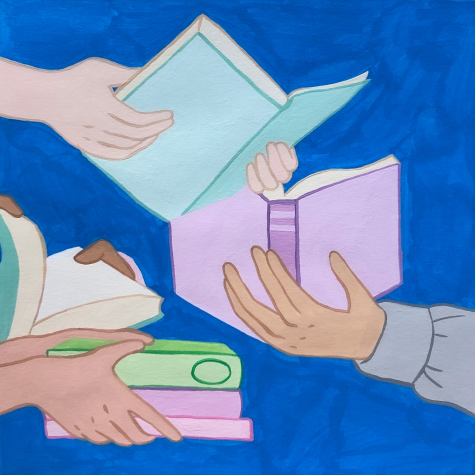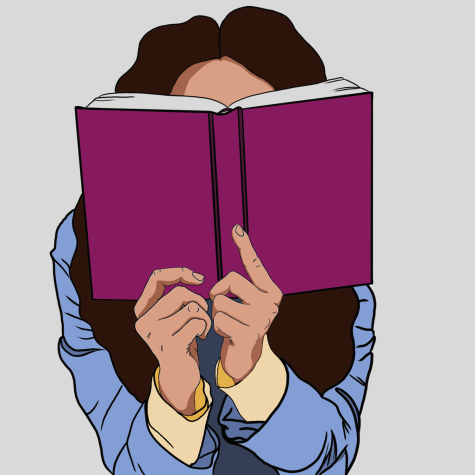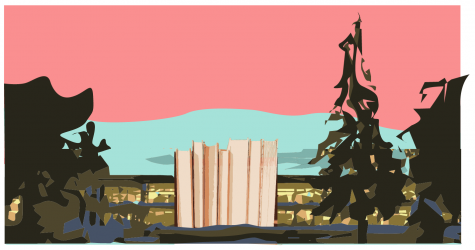Reading for class, reading for joy
November 11, 2021
Bring up “Percy Jackson” to a group of college students. If they’re anything like me, you’ll rouse memories of curling up with “The Lightning Thief” during free-reading time in elementary school and voraciously turning the book’s pages past bedtime. Nowadays, the bookmark in my copy of “All The Light We Cannot See” goes weeks without moving.
Every time I talk to another student about reading for pleasure, we both invariably express that we’d like to be doing more of it—regardless of whether they’re someone who reads outside of class with some regularity or hasn’t for years. Constrained by time, motivation and other priorities, a lot of us aren’t reading for fun as much as we’d hope to. But plenty of us are reading a lot: Class schedules that skew toward the humanities or social sciences can demand hundreds of pages read a week. And after a full day of reading, you’re seldom eager to pay attention to another book.

“Sometimes it’s nice to just have a mental break and go watch some dumb Netflix show,” sophomore Teagan Freda-Cowie said.
Freda-Cowie manages to average a book a semester outside of class. Because of scarce time for books, he’s choosy.
“When I’m dedicating the time to read a book, I want it to be a really good book,” he said.
Right now it’s “Anna Karenina.” It’s “good, kinda,” but he’s poking around for other recommendations. It’s easy for Freda-Cowie to immerse himself in a good book.
“You’re just deaf to everything. If someone’s like, ‘Teagan!’ I just don’t hear them,” he said.
Freda-Cowie finds the act of reading a book different from consuming other forms of media; you have to actively involve yourself in reading, but you can passively watch, say, a TV show. When it’s something that doesn’t require his involvement, “it’s much easier for me to not be fully in it,” Freda-Cowie said.
Senior English major Heleana Backus barely read in her first two years of college, because her time was eaten up by social media. “My brain was so full of things that weren’t serving me,” she said. So she began to dedicate more time to reading fiction, which she has a lifelong love for and hopes to study in graduate school—specifically, modern to contemporary literature. But her study of literature has complicated her relationship with reading as a way to relax.
“Being an English major makes it harder to tell when you’re working and when you’re not,” Backus said.
Backus struggles with how to approach her reading. The English major has taught her to look at books with a critical and analytic eye, which is useful for getting more depth out of the book, but this adds more work, too.
“Sometimes when I sit down to read a book for pleasure it’s hard to turn that off, and sometimes I ask myself, do I want to turn that off? Does it feel like work to continue reading when it’s like, 9 o’clock at night and I’m done with my homework if I’m looking at it critically?” she said.
But still, she studies what she loves for a reason.
“I feel like I get so much more out of what I read and that’s part of what motivates me to read outside of class,” she said.
Sophomore English and Classics double major Elise Sanders encounters the same quandary. As someone who’s “always been a bookworm,” her love of books led her to the English major. But now that she knows how to analyze literature, it’s a frame she can’t shake off when she reads for pleasure.
“I can’t find a way to enjoy it as is. I have to take a pencil; I have to mark everything; I have to highlight; I have to add little stickies for when to go back and look at that passage in depth. And then I realize, this is how I read for class,” she said.
When she was a kid, reading was an escape and a way to recharge. But “this isn’t how I used to read when I was in sixth grade reading ‘The Hobbit,’” she said. “And I get tired.”
Still, she’s always found comfort in reading. She’s fond of coming-of-age novels with a protagonist she can relate to. One of them is Jane Eyre.
“I could relate to the emotions, that I’m not weird for feeling this way, and I’m not alone,” she said.
She pointed to the famous fig tree metaphor Sylvia Plath uses in her novel “The Bell Jar” as a relatable way to talk about the anxieties of choosing a life path. I mentioned to her that I love that scene in “The Bell Jar” and that it’s one of my favorite books.
Our connection over “The Bell Jar” made me think about how meaningful reading can be, how exciting, how personal. Freda-Cowie thinks there’s a book out there for everyone.
“I think it’s just a matter of what you are reading,” he said.
Backus notices that “there’s this collective guilt that people feel for not reading for pleasure,” she said.
She has advice for those looking to get into reading.
“If people are wanting to begin reading for pleasure, I’d hope that they’d choose something that they’d enjoy and would motivate them to keep reading, not just what they think they should read,” she said.
I asked Freda-Cowie, Backus and Sanders for books that they liked. Fredia-Cowie said “Catch-22” by Joseph Heller. For Backus: “The Overstory” by Richard Powers. And Sanders said “The Secret History” by Donna Tartt. I put them all in my Notes app, for the day when I finally finish my current book—or make more time for reading.







